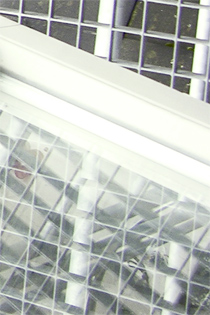Aurore Flipo et Patricia Lejoux | 03.04.2020
Born in 2005 in San Francisco and spread in Europe in the 2010s, the coworking spaces (CS) have progressively appeared as symbols of the new lifestyles and work processes derived from the digital revolution. This « new economy » has generated both forms of liberation from the spatial and temporal constraints, and new needs of co-presence and social interactions. CS have thus appeared as a potential answer to some of the social and spatial contemporary issues. While coworking as [...]
Enka Blanchard | 27.03.2020
This article explores the relationships that disabled people have with the space surrounding them. Extending Jacques Lévy’s work on various non-Euclidean spatialities, we study the discontinuous and discrete nature of space as inhabited by disabled people, with a focus on people with physical impairments. We start at a local scale, with perceptions of one’s body, of one’s environment, and the algorithmic nature of conscious movement. Lack of autonomy, often a consequence of society’s (lack of) accessibility, creates an experience [...]
Jean-Nicolas Fauchille | 20.03.2020
Une société juste. La réunion des termes justice et espace ne va pas de soi. En effet, les théories de la justice a-spatiales étaient considérées jusqu’à présent comme les seules auxquelles on avait recours pour répondre à la question : qu’est-ce qu’une société juste ? Savoir ce qu’est un espace juste ne faisait pour ainsi dire pas [...]
Clément Renaud et Florence Graezer Bideau | 28.02.2020
The present article relates how the figure of the « maker» has become an important figure in China’s recent industrial and urban policies. As Chinese cities are transitioning from a labor-intensive industry (Made in China) to an innovation-centered service economy (Created in China), the country is facing an urgent need for political leadership renewal. The « maker movement » has grown internationally to create new models for businesses and organisations using digital fabrication technologies, with the promise of bringing [...]
Sandra Mallet | 07.02.2020
The idea of an advanced social acceleration dominates in contemporary SHS writings. However, the links between this acceleration and the modalities of urban space production are still poorly explored. This article is based on the assumption that the acceleration of societies is linked to several aspects of urban production. Two elements are developed in this text. On the one hand, the evolution of social rhythms leads the actors of the urban fabric to consider the question of urban rhythms. [...]
Jacques Lévy, Ana Póvoas et Jean-Nicolas Fauchille | 23.01.2020
The book Théorie de la justice spatiale (2018) was published shortly before the outbreak of the political action of the Yellow Vests. The importance of the connections between space and justice in the public debate that followed shows that the spatial dimension of social life is now perceived in France as a component which cannot be reduced to others, more classic, like the economic and political dimensions. The concepts useful to think such a dimension, that the book advances, [...]
Les mutations de l’espace politique et ses enjeux.
Jacques Lévy | 10.01.2020
The major shifts that affect every electoral maps of the West for some decades are crystal-clear and convergent. They make possible simple, formalized propositions. However, some works show a reluctance to embed these changes in these approaches, as our theories of space/politics interactions require significant reshuffles. These novel phenomena generate a disruption that a part of the academic world finds hard to assume. This justifies an overall epistemological reflection on how scientists can encompass novelty in their research practices. [...]
Denis Retaillé | 20.12.2019
The zenith view offered by the maps may have led to the oblivion of their sources : horizontal experiences of space through the practical and theoretical mastery of distance. This oblivion and the figurative object, received as a higher reality in the form of the trace, were instruments of power. But the profusion of sources that are now imposed by alternative channels calls into question the scientific exercise of cartography, forcing us to return to the horizontal dimension of [...]
Marc Winz | 28.11.2019
This essay proposes an exploratory reflection of the heuristic potential of the notion of rhythm, and more precisely that of urban rhythms – a reflection that allows us to examine the relationships between people diagnosed with schizophrenia and the urban environment. The article first proposes a short state of the art of the relationship between cities and psychosis. Then, a brief discussion of the definition and status of the notion of rhythm allows to propose the concept as a [...]
Marina Soubirou et Nicolas Buclet | 27.11.2019
This paper examines the nature of the relationships between the inhabitants of the lower Susa Valley. Beyond their geographical proximity, they seem to be linked by bonds of cooperation forged through nearly half a century of local struggles, and they share a collective aspiration for strong sustainability. Because of these observations, we propose the notion of territorialized community, as the notions of territory and proximities are not sufficiently specific to describe the links uniting the Low-Valsusans and their space. [...]


